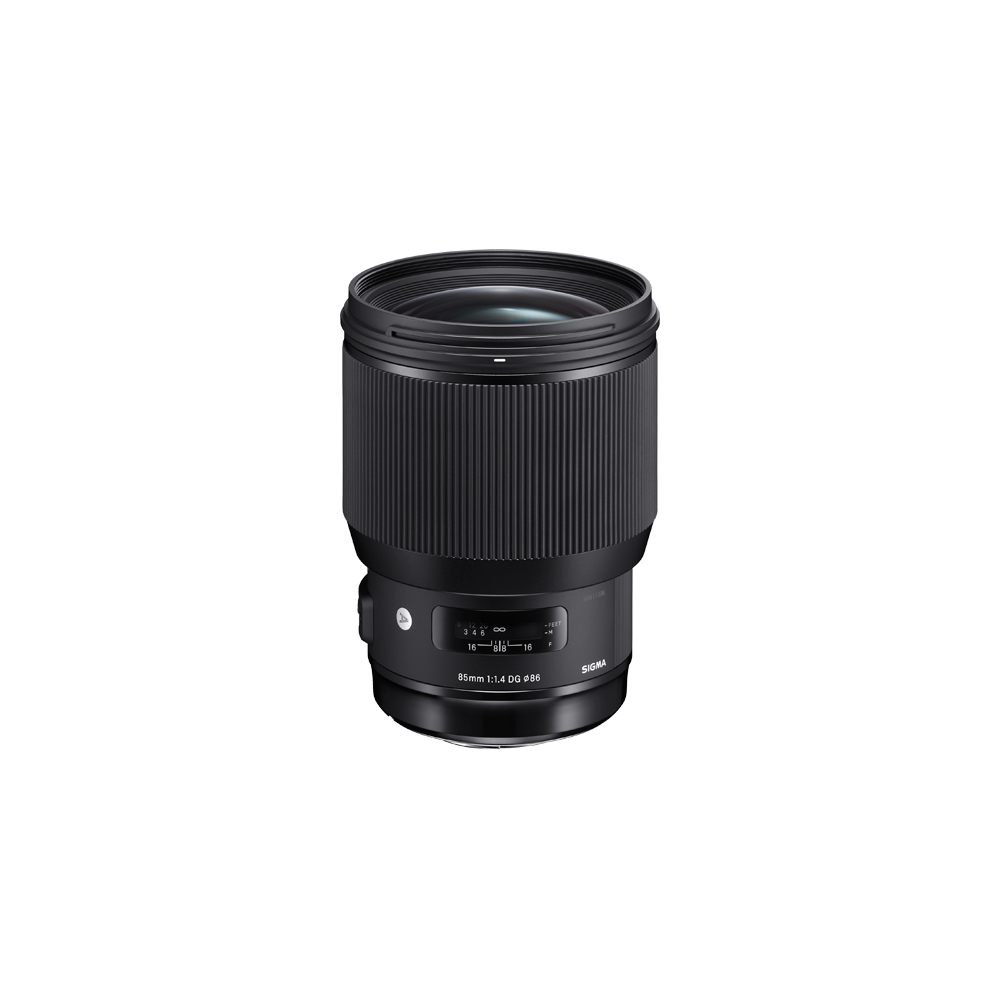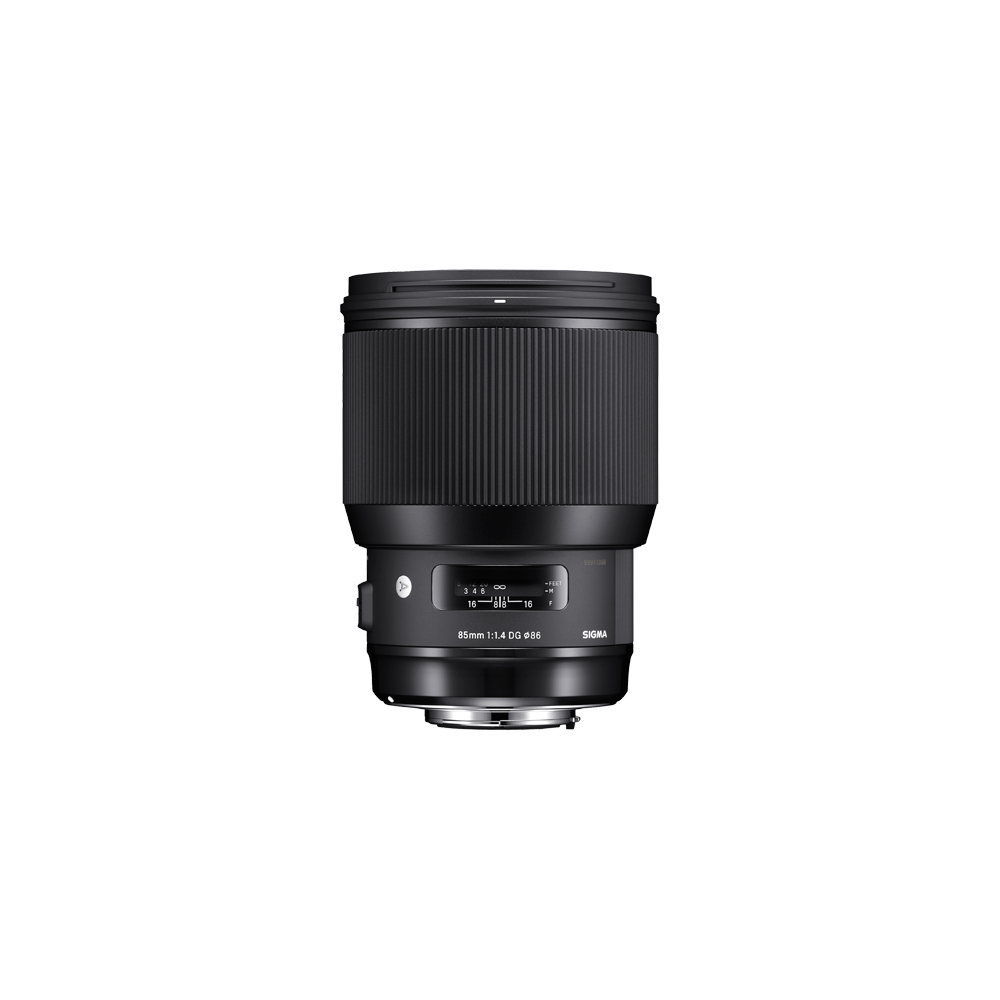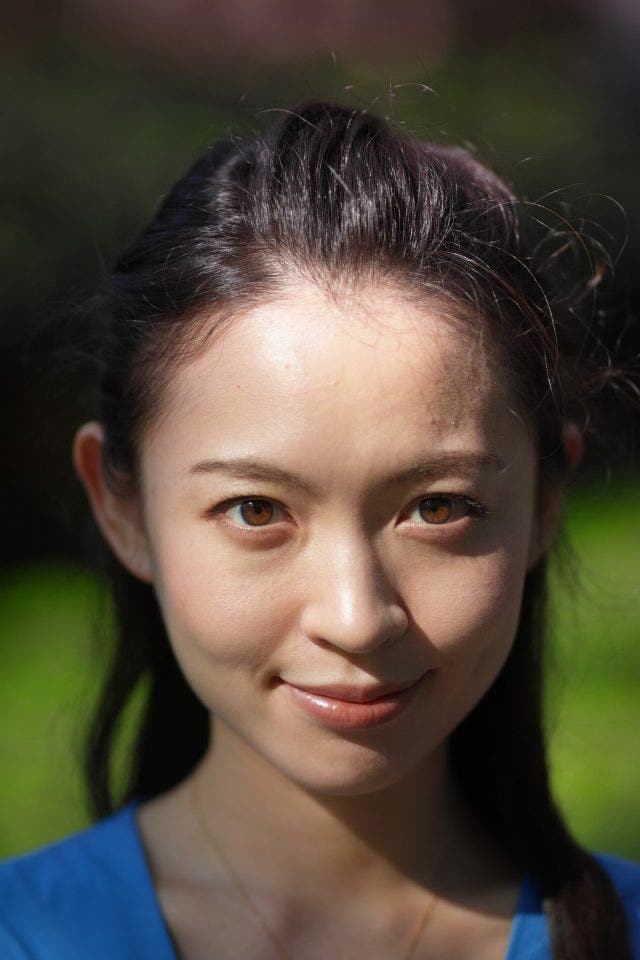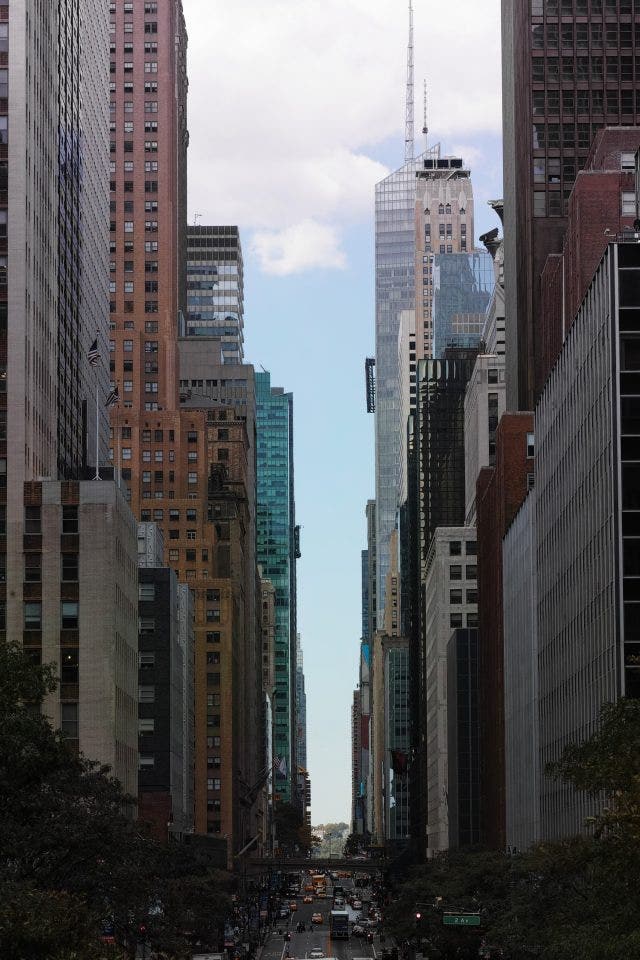85mm F1.4
DG HSM
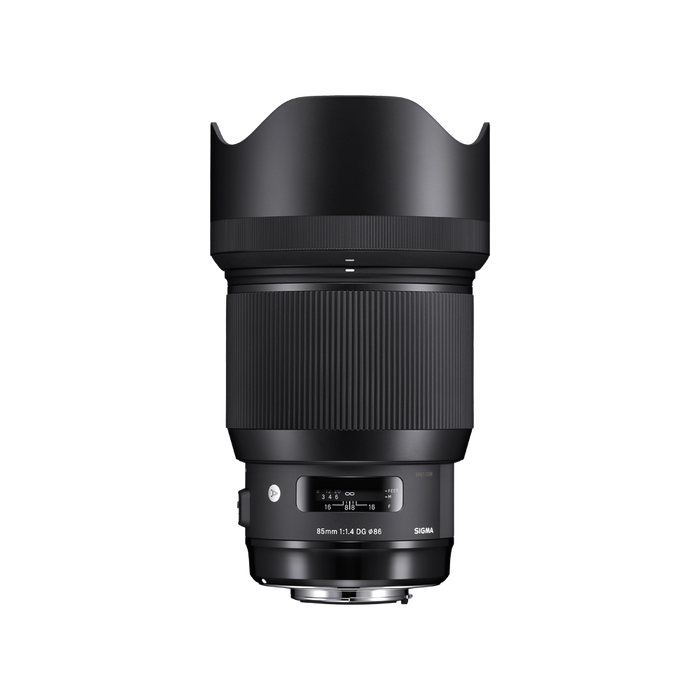

- Stellar optical performance
- DxO Mark Highest Score (Sep. 2016)
- Updated AF system with 1.3x the Torque
- Designed and tested for high mega-pixel cameras
- 86 mm filter size
- Accessories included: lens hood, caps, carrying case
- Made in Japan
AWARDS
|
2017 |
|
|
PROFESSIONAL PHOTOGRAPHER - HOT ONES |
2017 |
| Angle of view | Telephoto | |
|---|---|---|
| Camera Type | DSLR | |
| Lens Mount | L-Mount, Canon EF-mount, Nikon F, Sigma SA | |
| Sensor Size | Full Frame | |
| Construction | 14 Elements in 12 Groups | |
| Angle of view | 28.6° | |
| Number of diaphragm blades | 9 (rounded diaphragm) | |
| Minimum aperture | F16 | |
| Minimum focusing distance | 85 cm / 33.5in | |
| Maximum magnification ratio | 1:8.5 | |
| Filter diameter | 86mm | |
| Dimensions (diameter x length) | Sigma SA-mount ⌀ 94.7 mm x 126.2 mm |
|
| Weight (g) | Sigma SA-mount 1130g |
|
| Edition number | A016 | |
| Supplied Accessories | Lens Hood LH927-02, Front Cap LCF-86mm III, Rear Cap LCR II, Case LS-205L | |
| Accessories | WR Ceramic Protector Filter 86mm, WR Protector Filter 86mm, C-PL Filter 86mm, USB-dock UD-01, Mount Converter MC-11, Mount Converter MC-21 | |
| EAN-code | Canon EF 085126321543 |
|
| Specifications Info | 1. The Nikon mount version of this lens includes an electromagnetic diaphragm mechanism. Functionality may be limited on some camera bodies. *For Nikon F mount cameras, please see (*)Nikon camera compatibility Lenses for Nikon F mount with an electromagnetic diaphragm mechanism can be used with the following cameras. Before using with one of the cameras listed below, please update the lens to the latest firmware version. |
|
A design that prioritizes optical performance—without compromise.
Outstanding resolving power and minimized chromatic aberrations help make this the ultimate lens for portraits.
To create a top-performing 85mm F1.4 lens, Sigma leveraged its latest innovations in design and materials. The result is the ultimate lens for portraits. By taking chromatic aberrations to the absolute minimum, this lens offers performance that goes beyond, including incredibly sharp resolution and a beautiful bokeh effect.
Image quality perfect for ultra-high-megapixel digital cameras
Ultra-high-megapixel full-frame DSLRs offering 50-megapixel or higher resolution are now available, and nothing will bring out the performance potential of these cameras better than the fundamental performance of the lens. The Sigma 85mm F1.4 DG HSM | Art incorporates two elements made of SLD (Special Low Dispersion Glass) and one element with a high rate of anomalous partial dispersion and a high index of refraction. These features help ensure a clear image throughout the plane. The optical system also minimizes sagittal coma flare for outstanding image quality without streaking—even at wide-open aperture.
Sigma’s fifth large-diameter F1.4 lens for full-frame sensors.
Among its new product lines, this is the fifth large-diameter F1.4 lens Sigma has introduced for cameras with full-frame sensors. Sigma is the only lens manufacturer that covers 20-85mm at F1.4 brightness in its lineup. This latest lens reflects our experience with this specification and insistence on offering only the best.
The beautiful bokeh effect that only a large-diameter lens can offer
Elements made of SLD (Special Low Dispersion) glass and an optimized power distribution help minimize axial chromatic aberration. In the areas in front of and behind the point of focus, the optical system produces an attractive and natural bokeh effect by producing a smooth gradation of focus and minimizing streaking.
Exclusive low-dispersion glass
The degree to which light is refracted by glass depends on the light’s wavelength. This fact causes different colors of light to focus at slightly different points. The result is chromatic aberration, the color fringing that is particularly noticeable in telephoto lenses. Most chromatic aberration can be removed by combining a high-refractivity convex lens element with a low-refractivity concave element. Yet residual chromatic aberration known as “secondary spectrum” may still remain. To minimize this secondary spectrum, which can be a serious issue with conventional lenses, Sigma lenses feature up to three types of exclusive low-dispersion glass offering superior performance: ELD (Extraordinary Low Dispersion), SLD (Special Low Dispersion) and FLD (“F” Low Dispersion). In particular, FLD glass offers ultra-low dispersion in combination with high transmittance and the anomalous dispersion characteristics of fluorite. Meticulous deployment of these types of exclusive low-dispersion glass and optimization of power distribution gives Sigma lenses superlative image rendition undiminished by residual chromatic aberration.
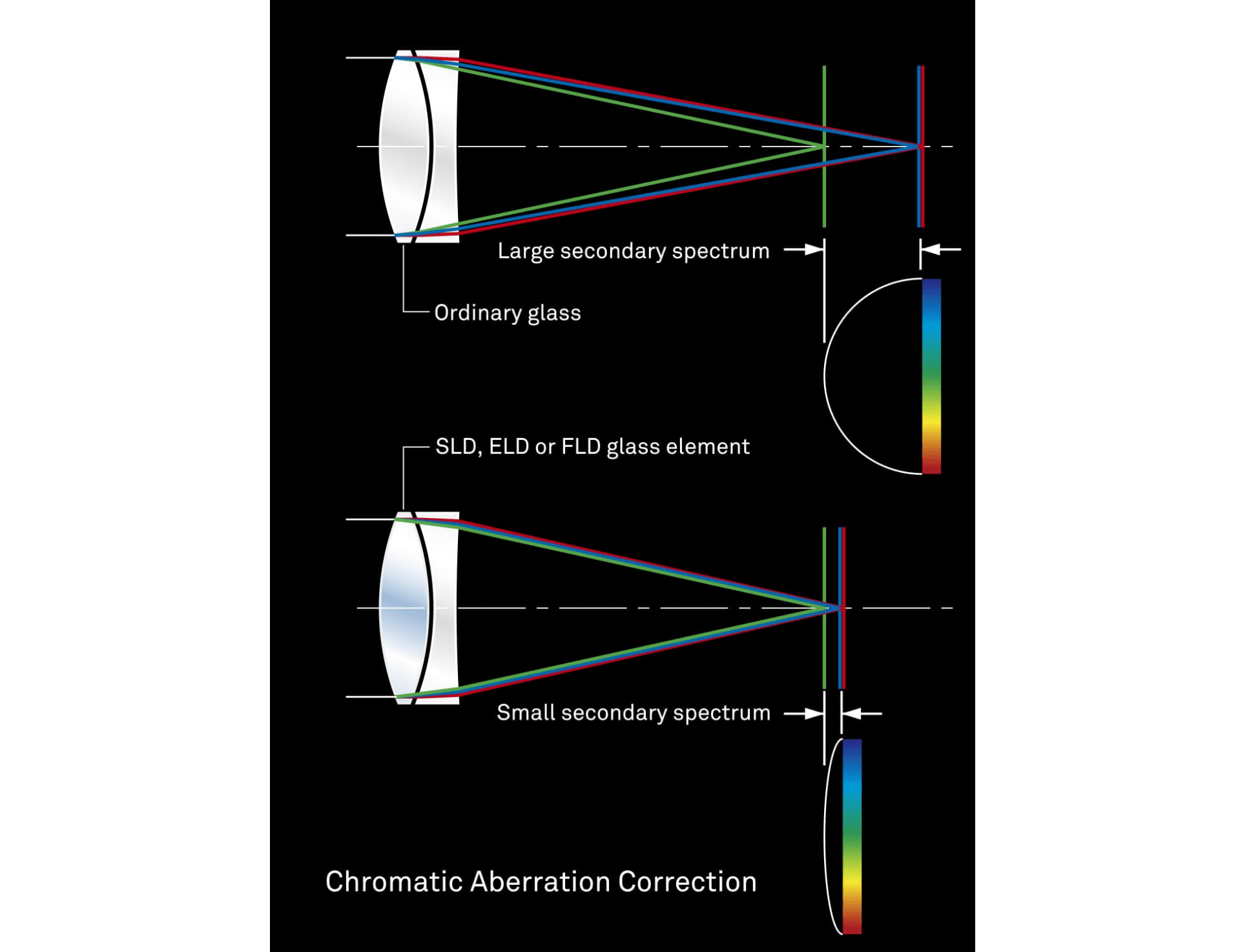

Designed to minimize flare and ghosting
From the start of the design process, Sigma measured flare and ghosting to establish an optical design that is resistant to strong incidental light sources such as backlight. At the prototyping stage, Sigma used not only simulations but actual photographic experiments to assess flare and ghosting under multiple criteria, identify the causes of these issues under a wide range of situations, and take measures to mitigate them. In addition, Sigma’s Super Multi-Layer Coating helps further reduce flare and ghosting and provide sharp, high-contrast images even in backlit conditions.
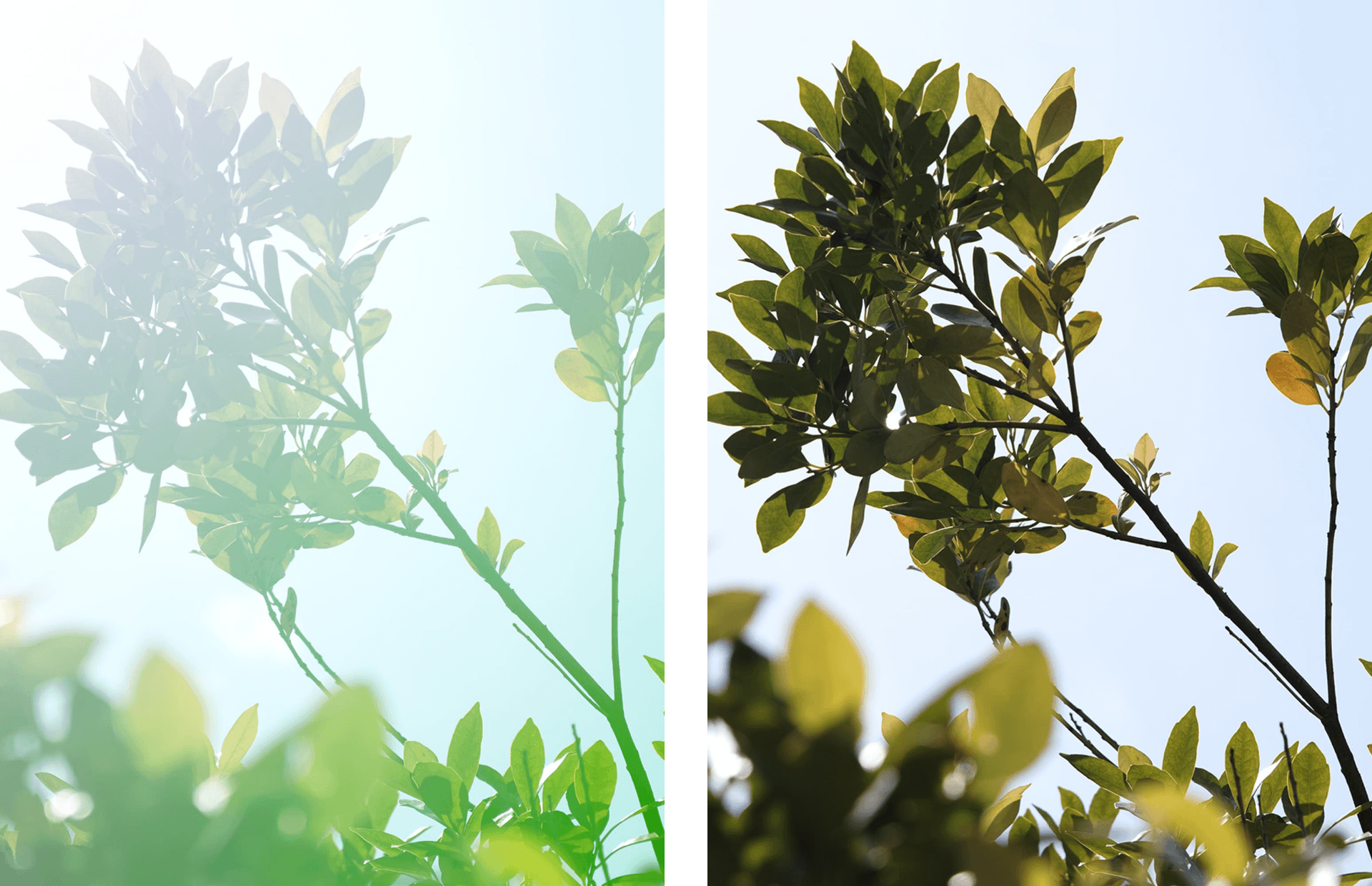

An all-new lens that leverages SIGMA’s latest design technologies.
Newly designed HSM, dust and splash resistant structure, and electromagnetic aperture control
Going beyond outstanding optical performance, Sigma has added all its latest technologies for outstanding usability. Newly designed HSM, dust and splash resistant structure, -this is the long-awaited prime lens from the Art line.
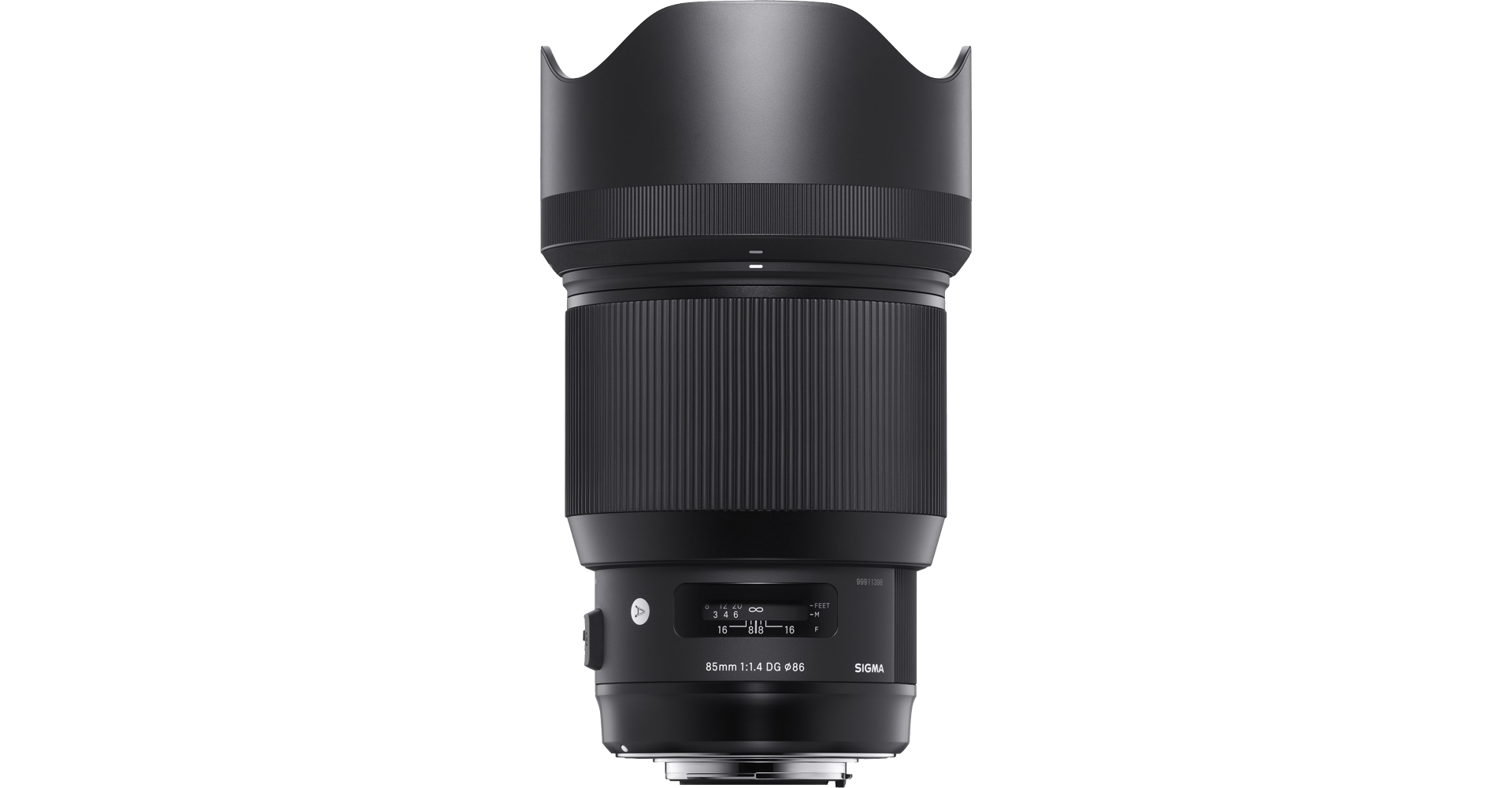

Newly designed HSM for nimble AF control
The newly designed Hyper Sonic Motor (HSM) offers 1.3 times the torque of its predecessor. Even at low speeds, it offers exceptionally stable performance, and the updated AF algorithm helps ensure nimble autofocus performance. In addition, full-time manual focus override allows the lens to be switched to manual focus simply by rotating the focus ring—even during continuous AF. The user can quickly find the perfect focus without needing to touch the focus mode switch.
The operation of full-time MF may vary based on mount type.
Mount with Dust and Splash Resistant Structure
The lens mount incorporates rubber sealing to protect the mount from dust and water drops.
High-precision, rugged brass bayonet mount
The brass mount combines high precision with rugged construction. Its treated surfaces and enhanced strength contribute to the exceptional durability of the lens.
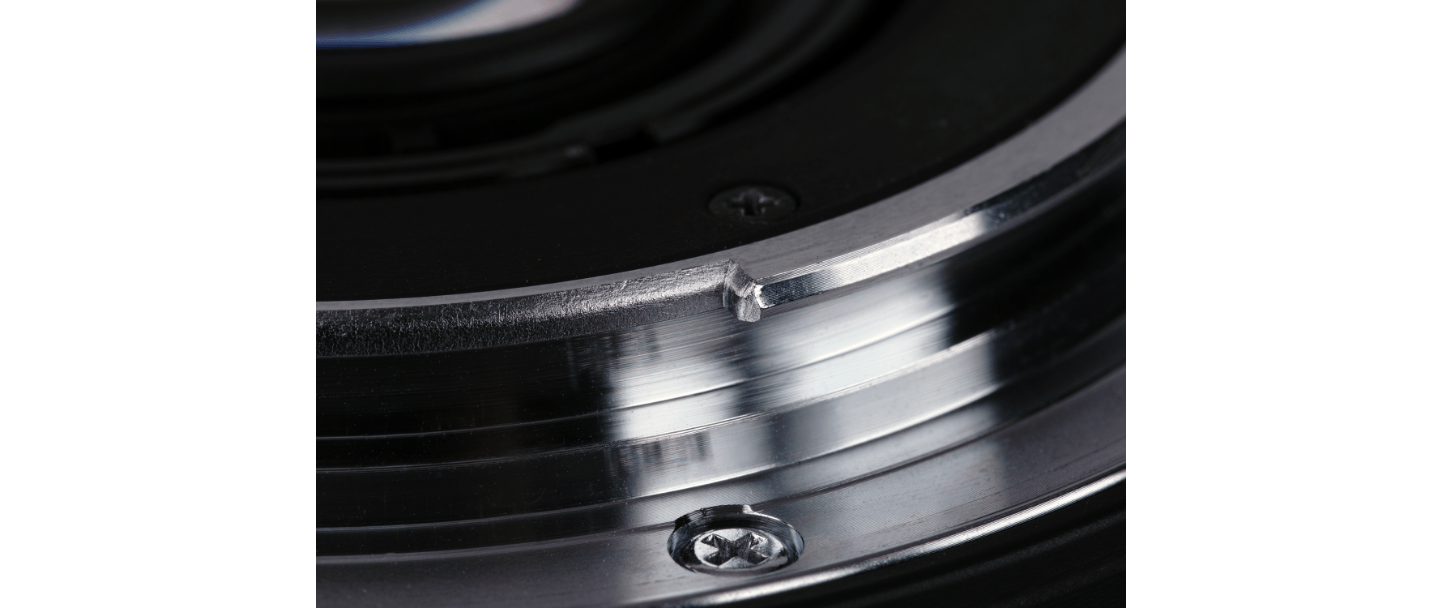

Nikon electromagnetic diaphragm mechanism included
The lens for the Nikon camera includes the electromagnetic diaphragm mechanism and is able to receive the appropriate signals from the camera body. This feature ensures precision diaphragm control and stable Auto Exposure (AE) performance during continuous shooting.
Rounded diaphragm
The 9-blade rounded diaphragm creates an attractive blur in the out-of-focus areas of the image.


Compatible with Mount Converter MC-11
Mount Converter MC-11 allows you to use your Sigma SA mount and Sigma EOS mount (Canon-compatible) interchangeable lenses with the Sony E-mount camera body. Owners of multiple camera systems can now get even more out of their valuable lens assets.


LENS CONSTRUCTION
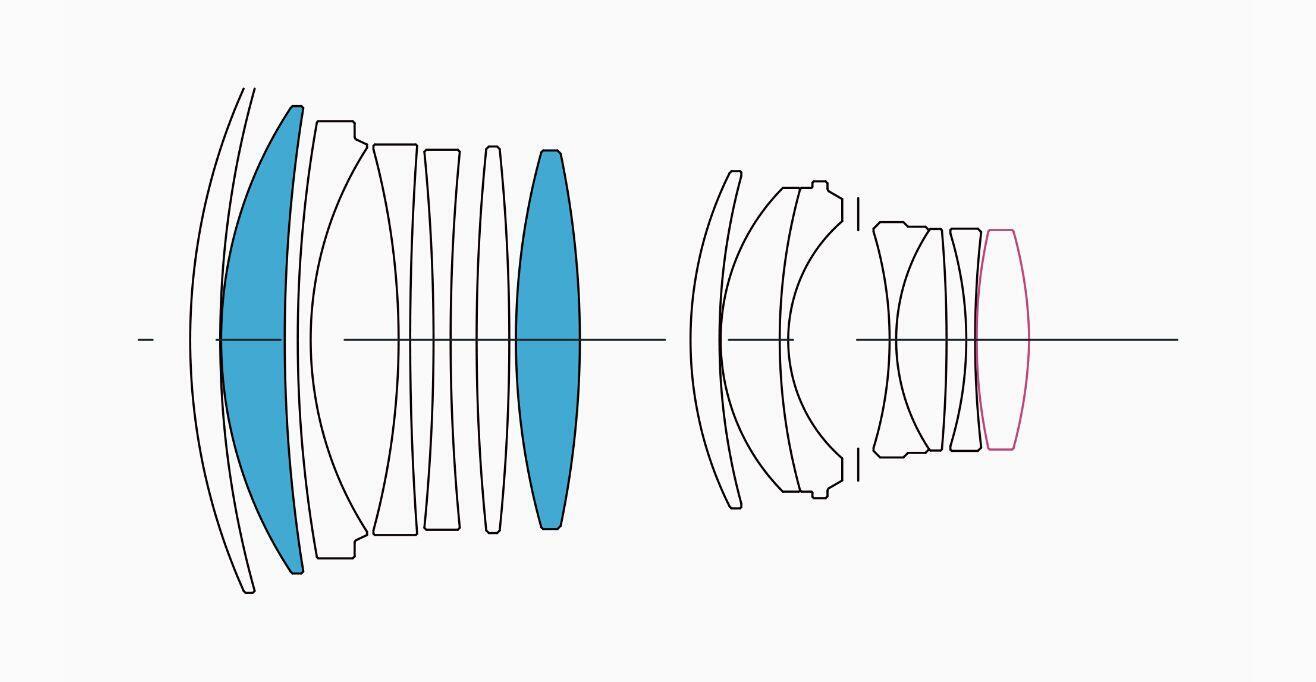

|
|
|
|
MTF CHART
The MTF (Modulation Transfer Function) is one of the measurements for evaluating a lens’ performance, and it shows how faithfully the contrast of the subject can be reproduced on the image plane. The horizontal axis shows the image height (distance from the center of the image in mm) and the vertical axis shows the contrast value (maximum value is 1).
The closer the 10 line pairs/mm curve is to 1, the higher the contrast and clarity of the lens is, and similarly, the closer the 30 line pairs/mm curve is to 1, the better the resolution and sharpness of the lens is.
*The MTF chart depicts the result at the wide-open aperture.
*For mirrorless lenses that support distortion correction, the horizontal axis shows the image height equivalent to when an L-Mount lens is attached to a Sigma L-Mount camera with distortion correction applied. (The effect of distortion correction may differ depending on the mount and camera used.)
*The spatial frequency indicates the variation on the image plane before distortion correction is performed.
|
Spatial frequency |
S:Sagittal Line |
M: Meridional Line |
|
10lp/mm |
|
|
|
30lp/mm |
|
|
DIFFRACTION MTF
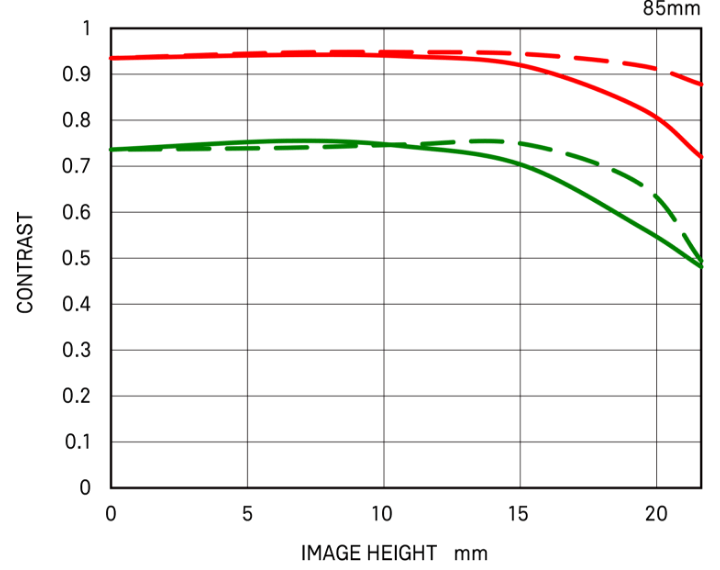

GEOMETRICAL MTF
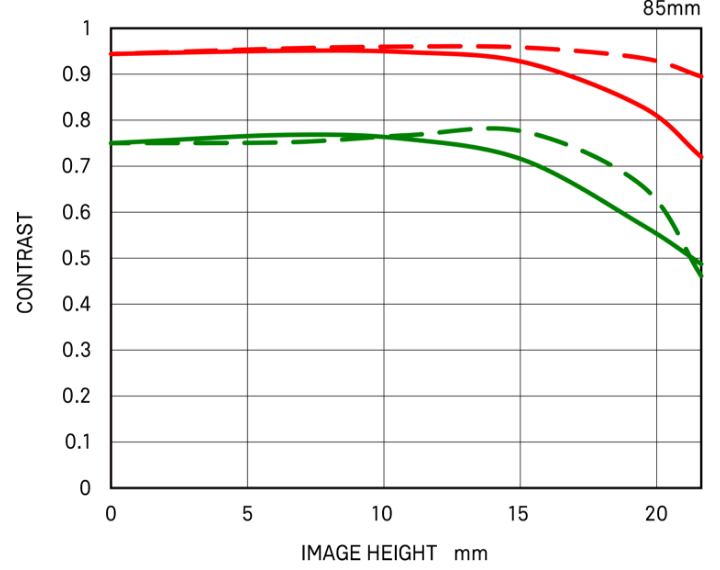

DISTORTION
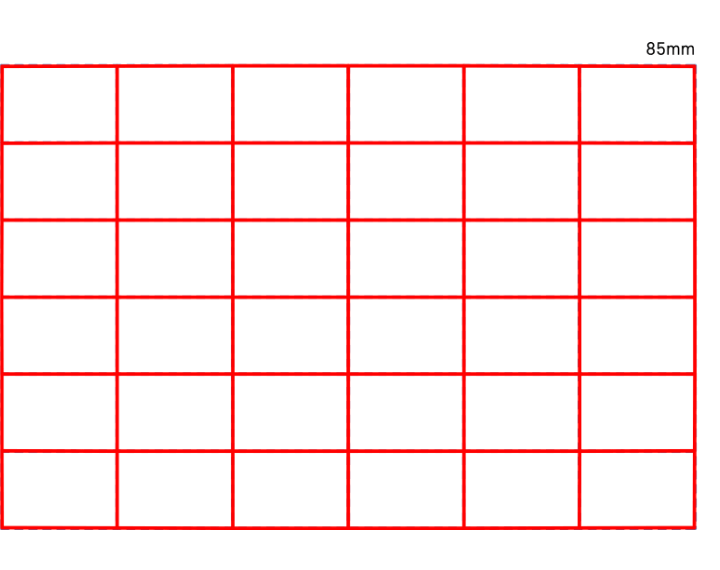

DISTORTION
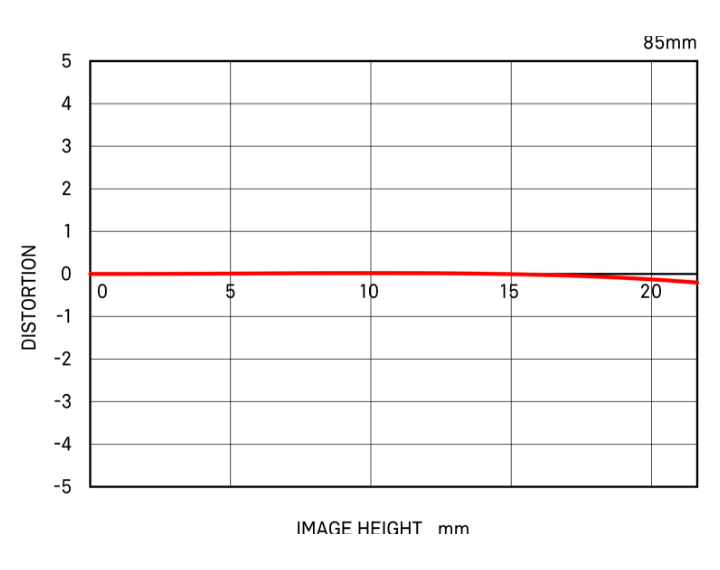

Nikon electromagnetic diaphragm mechanism
The Nikon mount version of this lens includes an electromagnetic diaphragm mechanism that allows it to receive the appropriate signals from the camera body. This feature ensures precision diaphragm control and stable Auto Exposure (AE) performance during continuous shooting.
High-precision, rugged brass bayonet mount
The brass mount combines high precision with rugged construction. Its treated surfaces and enhanced strength contribute to the exceptional durability of the lens.
Mount with Dust and Splash Resistant Structure
The lens mount incorporates rubber sealing to protect the mount from dust and water drops.
HSM (Hyper Sonic Motor)
The Hyper Sonic Motor (HSM) is an original SIGMA development that uses ultrasonic waves to drive the autofocus mechanism. Its extremely quiet operation helps avoid disturbing photographic subjects. High torque and speed assure rapid autofocus response. SIGMA uses two types of HSM: ring HSM and micro HSM. The Ring HSM configuration permits manual fine tuning of focus (manual override) by turning the focusing ring after autofocus is complete.
Rounded diaphragm
The polygonal shape of a conventional iris dia phragm causes out-of-focus light points to appear polygonal. A rounded diaphragm is designed to pro duce rounded out-of-focus light points when opened to near maximum aperture. This creates attractive bokeh effects in many situations, such as when pho tographing a subject against an out-of-focus surface of water from which light is being reflected.
Exclusive low-dispersion glass
The degree to which light is refracted by glass depends on the light's wavelength. This fact causes different colors of light to focus at slightly different points. The result is chromatic aberration, the color fringing that is particularly noticeable in telephoto lenses. Most chromatic aberration can be removed by combining a high-refractivity convex lens element with a low-refractivity concave element. Yet residual chromatic aberration known as "secondary spectrum" may still remain. To minimize this secondary spectrum, which can be a serious issue with conventional lenses, SIGMA lenses feature up to three types of exclusive low-dispersion glass offering superior performance: ELD (Extraordinary Low Dispersion), SLD (Special Low Dispersion) and FLD ("F" Low Dispersion). In particular, FLD glass offers ultra-low dispersion in combination with high transmittance and the anomalous dispersion characteristics of fluorite. Meticulous deployment of these types of exclusive low-dispersion glass and optimization of power distribution gives SIGMA lenses superlative image rendition undiminished by residual chromatic aberration.
PEAK 85MM F1.4 OPTICAL PERFORMANCE
THAT MORE THAN SATISFIES THE STRINGENT
STANDARDS OF THE ART LINE
With all the resolving power for 50-megapixel or higher ultra-high-megapixel cameras,this is the ultimate lens for portraits and more.arger text
The ultimate lens for portraits and more.
Portrait photographers demand the attractive bokeh effect that large-diameter lenses offer, as well as outstanding resolution. Fulfilling the exacting standards of the Art line, the Sigma 85mm F1.4 DG HSM | Art delivers both of these elements at the highest level. The bokeh effect is so precise, you can focus on the pupil of the subject’s eye while blurring the eyelashes. Adding to the effect, the area in focus is extremely high-resolution while the bokeh area is very attractive in appearance. The Sigma 85mm F1.4 DG HSM | Art incorporates 14 lens elements in 12 groups, a remarkable structure that helps the lens deliver ultra-high-resolution. This lens is therefore an excellent match for full-frame DSLRs offering 50-megapixel or higher resolution.
Art line delivers high-level artistic expression
Sigma is organizing all its interchangeable lenses into three product lines: Contemporary, Art, and Sports, each with a distinctive concept. Designed with a focus on sophisticated optical performance and abundant expressive power, our Art line lenses deliver high-level artistic expression. Offering astonishing rendering performance that meets the highest standard, they are perfect for landscapes, portraits, still-lifes, close-ups, and casual snaps. They are made for the kind of photography that unleashes the inner artist. A powerful ally in every genre of photography, Sigma’s Art line lenses excel both in the studio for formal works and outdoors for impressive shots of architecture, starry skies, and many other scenes.

